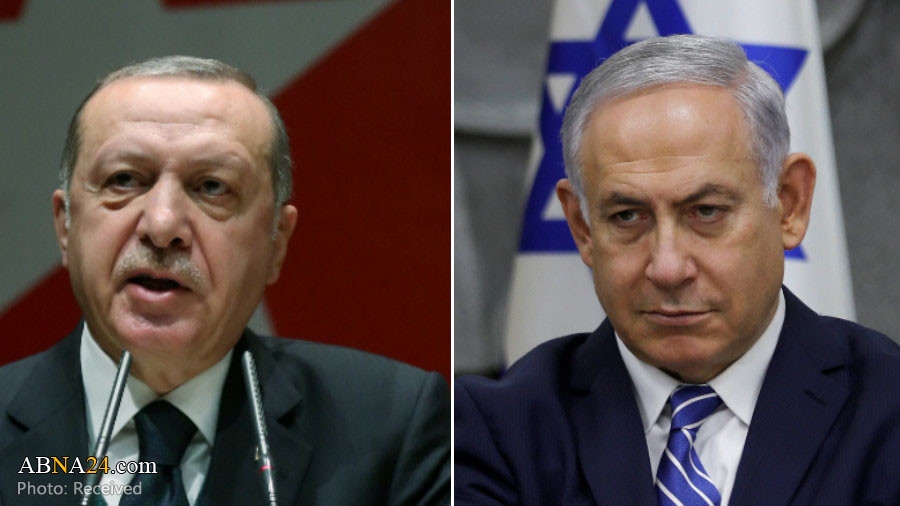AhlulBayt News Agency (ABNA): In recent years, Turkey’s entry into the geopolitical rivalries in various parts of the world from the Mediterranean and Central Asia to the Persian Gulf and North Africa left an undeniable influence on the disappearance of Ankara's zero-problem foreign policy with its neighbors. This issue along with the international developments and economic crises the world and Turkey is grippiling with have push Turkish officials to embark on a policy of de-escalation to counter the present and future challenges more powerfully.
One area where Turkey has shown a green light for de-escalation is relations with the Israeli regime. The Turkish-Israeli relations under Erdogan and the Justice and Development Party (AKP) have experienced many highs and lows and have been interrupted in some periods. However, the chilly relations have never had a noticeable impact on the relatively extensive economic ties.
In the current conditions, two kinds of factors make Turkey seek mended ties with the Israeli regime: Determinant factors that include the challenges pushing President Recept Tayyip Erdogan towards ending the chill with Tel Aviv to get rid of them. And affirmative factors that include common interests and the need for change in the bilateral relationship.
Economic crisis, European pressures on the Ankara programs in the Mediterranean Sea, Arab-Israeli normalization which caused Ankara to fear the rise of an anti-Turkish front, and most importantly the results of the US election are negative factors, and open cooperation between Tel Aviv and Ankara in Karabakh crisis and significance of geo-economic programs like the Israeli-Persian Gulf railway are among the affirmative factors.
Nevertheless, the Turkey's announcement of readiness for a détente is met by surprising Israeli preconditions. The top preconditions are the closure of the Hamas office in Istanbul and stopping activities of the freed captives of the Qassam Brigades, Hamas’s military wing, on the Turkish soil. The Israeli regime said that rapprochement with Ankara and the return of the ambassador to Turkey depend on the halt of Hamas activities in Istanbul.
Firstly, the Israeli preconditions are surprising because the main cause of the Turkish-Israeli tensions is the aggressive and repressive policies of the Israelis against the Palestinians. The tensions between the two reached a peak when in 2010, Israeli commandos raided Turkey’s Mavi Marmara ship heading to Gaza to break the siege and deliver humanitarian aids. From another dimension, in pursuit of the Palestinian developments, Turkey focuses mainly on economic and geopolitical interests and the expansion of its influence. In fact, Ankara supports to Palestinian liberation ideal hardly go beyond slogans and even in the political process, the Turks have always chosen compromises to the Israeli regime over resistance.
Secondly, Turkey sees itself as a regional power that, under the policies of the Erdogan government, longs for a return to the glorious past of the Ottoman Empire, and the Israeli regime, quite the opposite, to escape geopolitical isolation clings to any means, especially forcing the White House to exert pressure on Arab monarchies to yield to normalization.
Undoubtedly, one of the roots of the formation of such an attitude among the Israeli leaders, who can set humiliating conditions for improving relations with Turkey, like the crisis-stricken country of Sudan, is the important goal that Turkey pursues in reconciling with the Israelis. Turkey sees a bridge to salvation and a close path to improving relations with the United States, or in other words, reducing vulnerability caused by a conflict with the Biden government's regional policies, proximity to the Tel Aviv regime and the use of the regime's influence in the White House. Biden's administration has stated that it will follow the same path of imperative normalization Trump walked in the normalization, and Turkey will give a significant advantage to the Israelis by changing its course and aligning with this process.
But improving relations with Turkey, without changing Ankara's regional policies, conflicts with the nature and conditions of normalization. The US and the Israeli regime, in order to establish an alliance with the Arab sheikhdoms of the Persian Gulf, emphasize a common security perspective with these countries on the threats posed by Turkey and the Axis of Resistance.
In the meantime, proximity to Turkey without considering the Arab countries' concerns about Ankara's continued support for the Muslim Brotherhood can naturally disrupt the normalization process. Therefore, knowing that closing the Hamas office in Istanbul, along with improving relations with Egypt and Saudi Arabia, will undermine Turkey's influence among the Muslim Brotherhood and the Brotherhood's trust in Turkey throughout the region and thereby its influence in the region, Tel Aviv has set such a precondition.
On the other hand, the Israelis will try to cut off Turkey's hands in the Palestinian developments. This, which will be understood by the Palestinians as Erdogan’s turning of his back to the Palestinian cause— if not betrayal of it— in addition to reducing Turkey's influence in the Palestinian developments will also harm the legitimacy of the Erdogan government. And amid hard economic conditions and external pressures, the popular discontentment with the ruling party's utilitarian approach to the most important issue in the Islamic world would lead to the overthrow of Erdogan.
All these aspects considered, it can be said that Israel's conditions in practice will be, for Erdogan, something like the Treaty of Sevres, signed in 1920, which led to the disintegration of the Ottoman Empire.
/129

